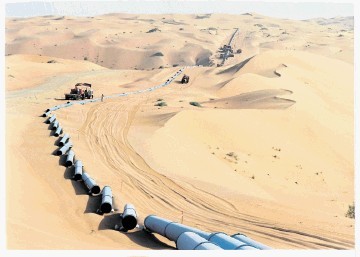
OPEC extended its campaign to restrain rival producers by continuing to pump oil into a global supply glut.
The 12 nations kept their combined daily production target at 30 million barrels after meeting in Vienna on Friday. Crude oil fell 0.6 percent in London, extending this week’s decline to 5.9 percent.
The Organization of Petroleum Exporting Countries’ decision signals intensifying competition for market share among global producers and more pain for U.S. shale drillers, who already idled a record number of rigs. It should also keep a lid on energy costs for consumers and help keep inflation in check.
“The more important part is how high the production will be over the next months and not the quota,” Giovanni Staunovo, commodity analyst at UBS Group AG, said by phone before the decision was announced. “If they keep producing above the quota as they did over the past 12 months, this quota is irrelevant.”
Benchmark crude prices rallied 34 percent from a six-year low in January and traded at $61.68 a barrel as of 2:15 p.m. in London. Prices will probably reach $75 by the end of the year, Iraqi Oil Minister Adel Abdul Mahdi said as the meeting started. Most OPEC members think $75 is a fair price, Iranian Oil Minister Bijan Namdar Zanganeh said.
The global supply glut in oil is diminishing, said United Arab Emirates Oil Minister Suhail Mohammed Al Mazrouei. The U.A.E., along with Kuwait and Qatar, backed Saudi Arabia’s strategy at the last meeting. The current ceiling has been in place for more than three years, making it the most enduring quota in the group’s 55-year history.
OPEC pumped 31.58 million barrels a day in May, exceeding its quota for a 12th consecutive month, according to data compiled by Bloomberg. Saudi Arabia is deploying the most rigs in at least two decades and operating with the lowest spare production capacity in about three years.
The battle for market share among global producers has just started, the International Energy Agency said May 13.
Iran’s Zanganeh said his nation would increase production by 1 million barrels a day within months of sanctions lifting. OPEC’s meeting came just three weeks before a deadline for a deal on Iran’s nuclear program.
Indonesia said it was seeking to rejoin OPEC, seven years after rising reliance on imports prompted the nation to withdraw from the group. The move would help to strengthen ties between oil producers and consumers, Indonesian Energy Minister Sudirman Said said in Vienna on Thursday.
Recommended for you
